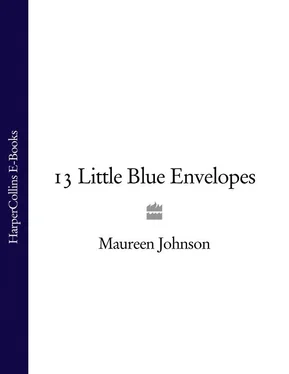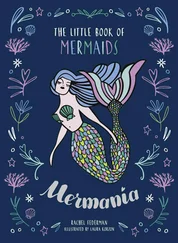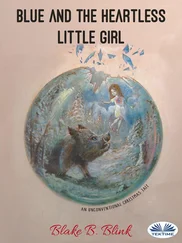There was a tiny tinkle of a chime and a sharp blast of air-conditioning as Ginny opened the door. Standing behind the counter was a pixie of a woman manning three phones at once. This was Alice, the owner, and Aunt Peg’s favorite neighbor. She smiled broadly when she saw Ginny and held up a finger, indicating that she should wait.
“Ginny,” Alice said, hanging up two of the phones and setting down the third. “Package. Peg.”
She disappeared through a bamboo curtain that covered a door into the back. Alice was Chinese, but she spoke perfect English (Aunt Peg had told her so). But because she always had to get right to the point (4th Noodle did a brisk business), she spoke in halting single words.
Nothing had changed since the last time Ginny had been here. She looked up at the illuminated pictures of Chinese food, the shiny plastic visions of sesame shrimp and chicken and broccoli. They glowed, not quite tantalizingly, more radioactively. The chicken pieces were a little too glossy and orange. The sesame seeds too white and too large. The broccoli was so green it seemed to vibrate. There was the blown-up and framed picture of Rudy Giuliani standing with a glowing Alice, taken when he had shown up one day.
It was the smell, though, that was most familiar. The heavy, fatty smell of sizzling beef and pork and peppers and the sweetish odor of vats of steaming rice. This was the scent that seeped through Aunt Peg’s floor and perfumed her. It rang such a chord in Ginny’s memory that she almost swung her head around to see if Aunt Peg was standing there behind her.
But, of course, she couldn’t be.
“Here,” Alice said, emerging from the beaded curtain with a brown paper package in her hand. “For Ginny.”
The package—an overstuffed padded brown envelope—was indeed addressed to her, Virginia Blackstone, care of Alice at 4th Noodle, New York City. It was postmarked from London and had the faintest aura of grease.
“Thanks,” Ginny said, accepting the package as gracefully as she could, given that she couldn’t lean over without falling face-first onto the counter.
“Say hi to Peg for me,” Alice said, picking up the phone and launching straight into an order.
“Right…” Ginny nodded. “Um, sure.”
Once she was out on the street, scanning Avenue A nervously for the cab she was going to have to hail for herself, Ginny wondered if she should have told Alice what had happened. But she was soon distracted by the sheer terror that her task caused her. Cabs were yellow beasts that sped through New York, whisking people who had to be places to the places they had to be and leaving terrified pedestrians scrambling for cover.
No, she thought, raising a timid hand as far as she could as a herd of her prey suddenly appeared. There was no reason to tell Alice what had happened. She barely believed it herself. And besides, she had to go.
The Adventures of Aunt Peg
When Aunt Peg was Ginny’s age (seventeen), she ran away from her home in New Jersey, just two weeks before she was supposed to go off to Mount Holyoke on a full scholarship. She reappeared a week later and seemed surprised by the fact that people were upset with her. She needed to think about what she wanted to accomplish in school, she explained, so she’d gone off to Maine and met some people who built hand-crafted fishing boats. Also, she wasn’t going to school now, she informed everyone. She was going to take a year off and work. And she did. She gave up her scholarship and spent the next year waitressing at a big seafood restaurant in downtown Philadelphia and living with three other people in a small South Street apartment.
The next year, Aunt Peg went to a tiny college in Vermont where nobody got any grades and where she majored in painting. Ginny’s mom, Aunt Peg’s older sister, had a pretty clear vision of what “real” college majors included, and this was not one of them. To her, majoring in painting was an act of insanity akin to majoring in photocopying or reheating leftovers. Ginny’s mom was born practical. She lived in a nice house and she had a little baby (Ginny). She encouraged her younger sister to become an accountant, like herself. Aunt Peg replied in a note that said she had picked up a minor in performance art.
As soon as she graduated, Aunt Peg went off to New York and moved into the 4th Noodle Penthouse, and there she remained. That was about the only constant in her life. Her job changed constantly. She was a manager at a major art supply store until she accidentally hit the zero one too many times on an online order form. Instead of the twenty non-returnable, custom-made Italian easels she was supposed to get, she was surprised to take delivery of two hundred. She answered phones as a temp at Trump headquarters until she happened to take a call from Donald himself. She thought it was one of her actor friends pretending to be Donald Trump—so she immediately launched into a tirade on “scumbag capitalists with bad toupees.” She enjoyed recounting the experience of being escorted out of the building by two security guards. To Aunt Peg, these jobs were just the things she did until her art career took off.
Again, this caused Ginny’s mother to despair over her little sister—and she always tried to remind Ginny that though she should love her aunt, she shouldn’t try to be like her. There was never really any danger of this. Ginny was just too well behaved, too normal for that ever to be an issue. Still, she loved her visits to Aunt Peg’s. Though they were erratic and all too infrequent, they were also magical experiences during which all normal rules of living were cast aside. Dinner didn’t have to be balanced and on the table at six—it could be Afghan kebabs and black sesame ice cream at midnight. Evenings weren’t spent in front of the TV. Sometimes they wandered through costume shops and boutiques, trying on the most expensive and outrageous things they could find—things Ginny would have been mortally embarrassed to put on around anyone else, and frequently things so pricey that she felt like she needed permission touch them. (“It’s a store,” Aunt Peg would say as she put on the five-hundred-dollar, saucer-sized sunglasses or the huge feathered hat. “The stuff is here to try on.”)
The best part about Aunt Peg was that when Ginny was around her, she felt more interesting. She wasn’t quiet and dutiful. She was louder. Aunt Peg made her different. And the promise had always been that Aunt Peg would be there—throughout high school, throughout college—to guide Ginny. “That’s when you’ll need me,” Aunt Peg always said.
One day, in November of Ginny’s sophomore year, Aunt Peg’s phone stopped working. Ginny’s mom sighed and figured the bill hadn’t been paid. So she and Ginny got in the car to drive up to New York to see what was going on. The apartment above 4th Noodle was vacant. The super told them that Aunt Peg had moved out several days before, leaving no forwarding address. There was a little note, though, stuck under the welcome mat. It read: Something I just have to do. Be in touch soon.
At first, no one was too concerned. It was assumed that this was just another Aunt Peg escapade. A month went by. Then two. Then the spring semester was over. Then it was summer. Aunt Peg was simply gone. Then came a few postcards, basic assurances that she was doing well. They were postmarked from a variety of places—England, France, Italy—but they contained no explanations.
So Aunt Peg was exactly the kind of person who would send her to England alone, with a package from a Chinese restaurant. That wasn’t so odd.
The odd part was that Aunt Peg had been dead for three months.
That last fact was a little hard to swallow. Aunt Peg was the most lively person Ginny had ever known. She was also only thirty-five years old. That number was stuck in Ginny’s head because her mother kept repeating it over and over. Only thirty-five. Lively thirty-five-year-olds weren’t supposed to die. But Aunt Peg had. The phone call had come from a doctor in England explaining that Aunt Peg had developed cancer—that it had come quickly, that everything had been tried but nothing could be done.
Читать дальше










